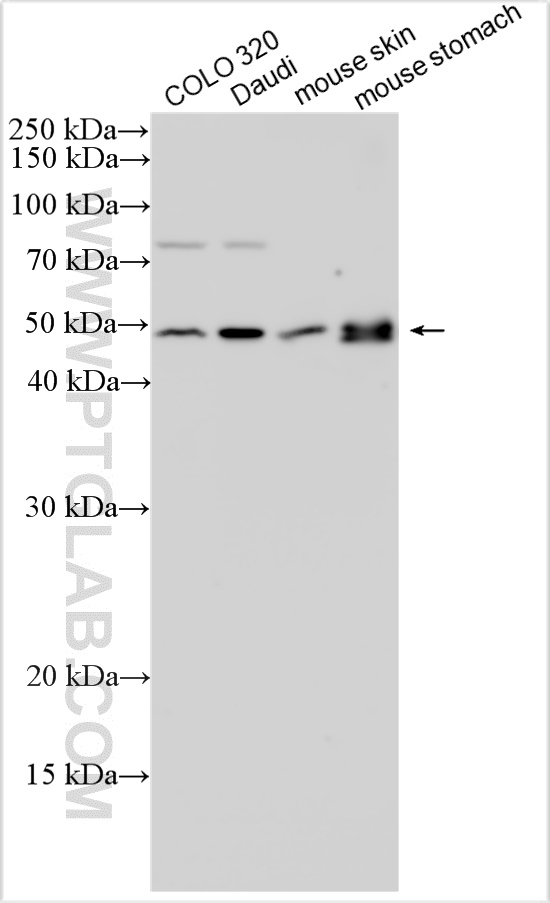验证数据展示
经过测试的应用
| Positive WB detected in | COLO 320 cells, Daudi cells, mouse stomach tissue, mouse skin tissue |
推荐稀释比
| 应用 | 推荐稀释比 |
|---|---|
| Western Blot (WB) | WB : 1:2000-1:14000 |
| It is recommended that this reagent should be titrated in each testing system to obtain optimal results. | |
| Sample-dependent, Check data in validation data gallery. | |
产品信息
30354-1-AP targets GSDMA in WB, ELISA applications and shows reactivity with Human, mouse samples.
| 经测试应用 | WB, ELISA Application Description |
| 经测试反应性 | Human, mouse |
| 免疫原 |
CatNo: Ag31284 Product name: Recombinant human GSDMA protein Source: e coli.-derived, PGEX-4T Tag: GST Domain: 232-445 aa of BC109197 Sequence: PPGEKSGEEKVILIQASDVGDVHEGFRTLKEEVQRETQQVEKLSRVGQSSLLSSLSKLLGKKKELQDLELALEGALDKGHEVNLEALPKDVLLSKEAVGAILYFVGALTELSEAQQKLLVKSMEKKILPVQLKLVESTMEQNFLLDKEGVFPLQPELLSSLGDEELTLTEALVGLSGLEVQRSGPQYMWDPDTLPRLCALYAGLSLLQQLTKAS 种属同源性预测 |
| 宿主/亚型 | Rabbit / IgG |
| 抗体类别 | Polyclonal |
| 产品类型 | Antibody |
| 全称 | gasdermin A |
| 别名 | FKSG9, FLJ39120, Gasdermin 1, gasdermin A, GSDM, GSDM1, GSDMA |
| 计算分子量 | 445 aa, 49 kDa |
| 观测分子量 | 49 kDa |
| GenBank蛋白编号 | BC109197 |
| 基因名称 | GSDMA |
| Gene ID (NCBI) | 284110 |
| RRID | AB_3086299 |
| 偶联类型 | Unconjugated |
| 形式 | Liquid |
| 纯化方式 | Antigen affinity purification |
| UNIPROT ID | Q96QA5 |
| 储存缓冲液 | PBS with 0.02% sodium azide and 50% glycerol, pH 7.3. |
| 储存条件 | Store at -20°C. Stable for one year after shipment. Aliquoting is unnecessary for -20oC storage. |
背景介绍
Gasdermins, a family of five pore-forming proteins (GSDMA-GSDME) in humans expressed predominantly in the skin, mucosa and immune sentinel cells, are key executioners of inflammatory cell death (pyroptosis), which recruits immune cells to infection sites and promotes protective immunity. GSDMA was predicted to enable phosphatidylinositol-4,5-bisphosphate binding activity, phosphatidylinositol-4-phosphate binding activity, and phosphatidylserine binding activity. Involved in apoptotic process.
实验方案
| Product Specific Protocols | |
|---|---|
| WB protocol for GSDMA antibody 30354-1-AP | Download protocol |
| Standard Protocols | |
|---|---|
| Click here to view our Standard Protocols |


